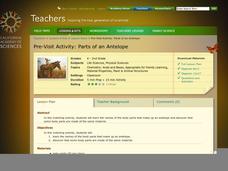Google
The White House
Taking a guided tour through the White House would require extensive travel costs and an armed security escort—but a virtual tour only requires an Internet connection! A few clicks bring users through the historical corridors and rooms...
Special Olympics
Train at School
Here is a fantastic compilation of adaptive physical education lesson plans that cover the major concepts of physical fitness, including: aerobic endurance, balance, coordination, flexibility, power, speed and agility, and strength.
SP Controls
Doceri
Take off those chains binding you to the whiteboard and create custom presentations using an interactive program that makes even voice recording a breeze. Choose from a variety of backgrounds, writing tools, and timing options. Perfect...
Smithsonian Institution
Our Story: Duke Ellington and Jazz
Get parents or guardians into the swing of things with a jazzy homework assignment. A detailed six-page guide provides before, during, and after reading suggestions for Duke Ellington: The Piano Prince and His Orchestra, Andrea Davis...
Museum of Disability
Zoom!
Turn your class' focus on how wheelchairs assist individuals with disabilities to become more independent with this disabilities lesson plan. Scholars listen to a read aloud of the book, Zoom! by Robert Munsch, answer questions about key...
California Academy of Science
Tropical Belt
Where in the world is the equator? Explore a world map with your class, coloring in oceans, continents, and rainforests while locating the three major lines of latitude: the equator, Tropic of Cancer, and Tropic of Capricorn. Discuss how...
California Academy of Science
Be Prepared for an Earthquake
Earthquakes can be frightening and dangerous, but being prepared can make a world of difference. Perform an earthquake simulation during which the class practices how to drop, cover, and hold on as you read a script describing what might...
California Academy of Science
Parts of an Antelope
There are so many wonderful parts to an animal: fur, antlers, tails, and legs, to name a few. A large diagram of an antelope is used to start a matching game, where the class matches body parts made of the same material. They discuss...
California Academy of Science
Fish Forms
I've said it before, and I'll say it again, you can add art to any lesson! While little learners are discovering why fish have specific body parts such as, scales, fins, and gills, they start making three-dimensional fish forms. Children...
California Academy of Science
What Would Happen?
Nothing says classroom fun like an invertebrate and a magnifying glass! Snails, earthworms, and roly-poly bugs become the center of attention as pint-sized investigators hone their inquiry and observation skills. They are guided through...
California Academy of Science
Snakes and Lizards Length and Movement
Snakes and lizards can be very tiny or very long. Your class will get out their rulers to see just how big snakes and lizards can be. They discuss several different reptiles by reading the included animal fact cards, then each small...
California Academy of Science
Coral Reef Habitat Match
Different animals live in different habitats, and each animal has specifically adaptive traits that make them tailor-made for their environments. This is true on land and in the ocean. Little ones examine how various marine animals have...
California Academy of Science
The Emperor Penguin's Egg
Here is a game intended for use at home that could easily be adapted to the school environment. The class reads an informational story about emperor penguins and then they watch a clip from the film, March of the Penguins. They focus on...
California Academy of Science
Notice and Wonder
Pint-sized zoologists practice the art of observation. They take notes, pictures or written, as they observe an animal for a period of time. This can be done at the zoo, with a visiting classroom animal, or perhaps at the humane society....
Learnbat
ShowMe Interactive Whiteboard
A presentation tool to record written text and pictures with audio voice-over and share privately or publicly online.
Curated OER
Blue Ribbon Readers: Making Connections
Model for young readers how to make the shift from passive to active reading by making text-to-self and text-to-text connections. After a series of activities that provide guided practice, the focus shifts to making text-to-words...
Curated OER
Am I Taller than an Antelope
Students investigate biology by examining body sizes of different animals. In this antelope measurement lesson, students research the physicality of Antelopes and other large animals that inhabit Earth. Students create a model Antelope...
Curated OER
Sorting Candy
Lower graders sort and group objects by their different properties. They watch a video about sorting then, sort and organize candy in different groups. Young scholars compare how others sorted their candy. Finally, they decide which...
California Academy of Science
Fraction Penguin
Exploring mathematics through art is a fun and concrete way to help learners grasp a concept. They will construct a paper penguin using fractions cut from circles. They'll need to determine 1/8, 1/4, and 1/2 of each circle. Once the...
California Academy of Science
Make your own Antelope Horns!
What are those horns for anyway? Little ones discuss the shape, texture, and purpose of horns found on animals such as the deer and antelope. They then pair up and make their own set of antelope horns to wear while visiting a local...
Curated OER
Coral Polyp Party
Students complete a project where they label the parts of a coral polyp and discuss the differences between plants and animals. Students use marshmallows, sprinkles, toothpicks, and more to label their coral polyp.
Curated OER
Rainforest Plant or Animal?
Students explore the major functions of plants and animals. For this rainforest lesson plan students create a Venn diagram to compare and contrast animals in the rainforest.
Curated OER
More! A Lesson on Comparing
Students practice counting and comparing objects. In this math lesson, students view a Count on It! episode. Students examine the value of what they are counting. Students estimate number in groups of items. Students determine which...
Curated OER
Parts of Plants Quiz #1
In this parts of plants learning exercise, students complete an on-line quiz, choosing questions and matching answers. Students score 1 point for each correct answer; a printed version is available.

























